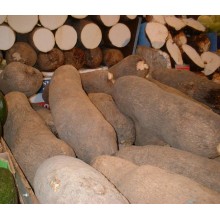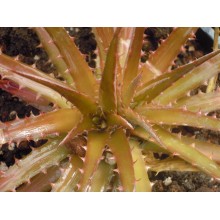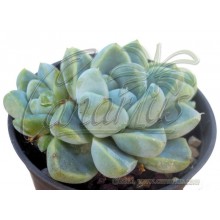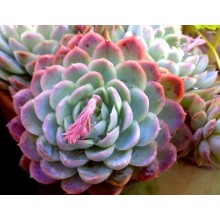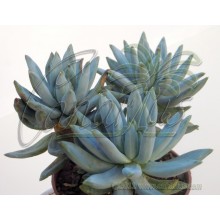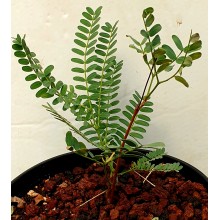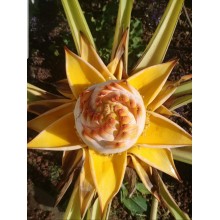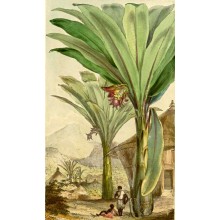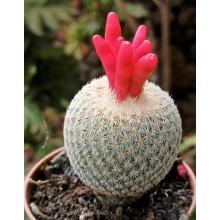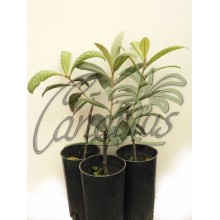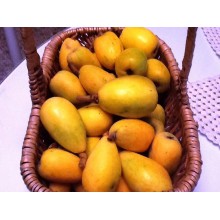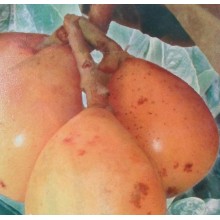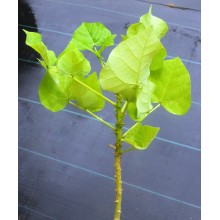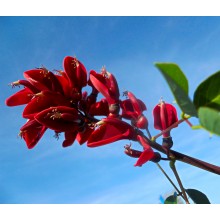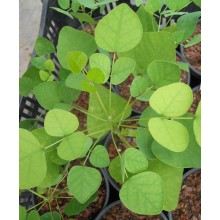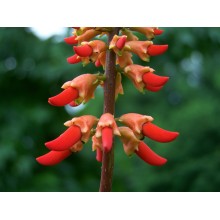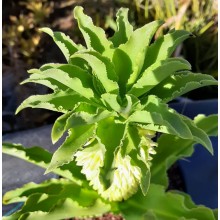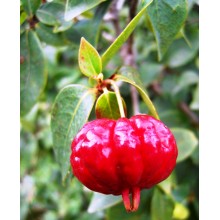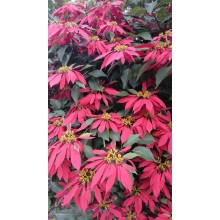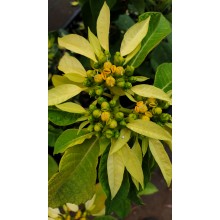Cold-Hardy Plants There are 309 products.

This is our selection of plants that can stand some cold. Some will only resist to cool weather and light frost, but some others will take hard frost in colder climates. They are all very different but they deserve to be tried because all these tropical-looking plants have non tropical requirements. They will surely thrive outdoors in coastal Mediterranean climates or in a mildly heated greenhouse where frost does not occur.
-
Dioscorea polystachya - Chinese Yam
Dioscorea polystachya - Chinese Yam
Chinese yam is a large climbing plant with arrow-shaped leaves. The tubers are cylindrical, with lots of tiny bumbs., They edible and usually cooked, but they can also be eaten raw. The plant is hardy to -17 C.
21,00 € -
Dyckia fosteriana rubra
Dyckia fosteriana rubra
This is a supreme clone of Dyckia fosteriana, with bronze coloured rosettes. It is a cold-resistant bromeliad from the rocky mountains of Paraná, in South Brazil.
19,50 € -
Echeveria albicans
Echeveria albicans
Cont.= 8,5 cm. This Echeveria from Hidalgo, Mexico, can take frost to about -4 C. It is a Clumping plant with rosettes of 10-18 cm in diameter and crimson-pink flowers. Albicans means "Whitening" because some parts are almost white.
10,70 € -
Echeveria elegans
Echeveria elegans
NEW! Cont. = 8 cm . Elegant species with pale silver-green rosettes and coral-pink flowers with yellow tips . It is a cold hardy Echeveria native to Hidalgo, in NW Mexico.
10,70 € -
Echeveria tolimanensis
Echeveria tolimanensis
NEW! - Cont.= 8,5 cm. Different from most echeverias because of the blue, thick cylindrical leaves. It is native to Hidalgo, in Mexico and will take light frost if kept dry in winter.
10,50 € -
Elephantorrhiza burkei
Elephantorrhiza burkei
Beautiful caudex plant native to South Africa. It has an elegant mimosa-like foliage and builds an underground caudex to at least 30 cm in diameter.
54,00 € -
Ensete lasiocarpum - Golden Lotus Banana
Ensete lasiocarpum - Golden Lotus Banana
This exciting ornamental is a cold-hardy mountain banana-relative, native to China. It grows banana-like leaves to height of about 1,5 m, and then blooms with a showy golden "artichoke", lasting for months.
89,80 € -
Ensete ventricosum - Abyssinian Banana
Ensete ventricosum - Abyssinian Banana
This "mountain banana" comes from high-elevation tropical Africa and bears enomous leaves with a solid red rachis. It grows well in warm temperate and Mediterranean climates. It is not a true banana of the genus Musa, so its fruits are not edible. Nevertheless, in Africa the corms are regularly collected and eaten.
57,30 € -
Epitelantha micromeris
Epitelantha micromeris
Very ornamental small cactus from the SW USA and Mexico, coated with white unharmful spines. It blooms in late winter with pale pink flowers that are soon followed by some very attractive frutis, which are dark pink, glossy and last form months!
10,80 € -
Eriobotrya japonica 'Algerie'
Eriobotrya japonica 'Algerie'
Commerial Spanish cultivar with round orange fruits, juicy with sweet, not-too-acid flavour. The tree is robust, with an erect crown, averaging 3 shoots per central shoot. Japanese Loquat is an excellent tree combining beauty and good-tasting fruits.
52,00 € -
Eriobotrya japonica 'Peluche'
Eriobotrya japonica 'Peluche'
Grafted tree. Spanish cultivar with very large, smooth, juicy fruits of "Japanese loquat", with a pale colour. The perfect fruit tree for the home garden, with sweet and acid fruits and very ornamental foliage. Fully hardy to about -7 C but also survives to about -17 C.
44,70 € -
Eriobotrya japonica 'Tanaka'
Eriobotrya japonica 'Tanaka'
Tanaka is a late-bearer and has rounded large fruits of good quality, sweet, thin-skinned. It is is self-fertile, even though it will bear more fruits if crossed with other cultivars of Loquat.
60,48 € 67,20 €Reduced price! -
Erythrina caffra
Erythrina caffra
1-2 year old seedling. This "Dwarf Coral Tree" is native to Natal, in South Africa. It is a densely branched deciduous shrub, with scarlet flowers on black flower stalks, standing above the foliage during a long time. It is suited to mediterranean climates and takes light frosts.
32,50 € -
Erythrina crista-galli-Large
Erythrina crista-galli-Large
A classic of subtropical gardening. This is one of the cold-hardiest coral-trees and it is quite easy to grow and bloom, with fabulous sprays of large coral-red flowers. It can be a small shrub to a tree of 10 or more meters in height.
88,00 € -
Erythrina flabelliformis
Erythrina flabelliformis
This Dwarf Coral Tree is native to Arizona, New Mexico and Mexico. It is a shrub with white bark, erect growth and truly showy scarlet flowers. It is suited to warm temperatate to subtropical climates. Its small size and frost resistance ( to about -6 C !) make it suitable for Northern latitudes.
41,00 € -
Erythrina humeana
Erythrina humeana
Dwarf Coral Tree is native to Natal, in South Africa. It is a densely branched deciduous shrub, with scarlet flowers on black flower stalks, standing above the foliage during a long time. It is suited to mediterranean climates and takes light frosts.
38,80 € -
Eucomis autumnalis subsp. clavata
Eucomis autumnalis subsp. clavata
This beautiful South African bulb is a short robust subspecies of the pineapple lily Eucomis autumnalis. It is summer growing and deciduous in winter. Rosettes are moderate in size, with soft wide leaves, with crisped and wavy margins.
15,60 € -
Eugenia uniflora - Pitanga, Suriname Cherry
Eugenia uniflora - Pitanga, Suriname Cherry
Subtropical shrub to small tree, producing sweet dark red "cherries", sometimes a bit acid, loved by children. It stands light freezes and grows outdoors in the coastal Mediterranean. It can be trained as a hedge or bonsai.
37,50 € -
Euphorbia pulcherrima 'Tall Wild Type'
Euphorbia pulcherrima 'Tall Wild Type'
This is the most classic tall heirloom poinsettia which is so widespread in the old gardens of the Canary Islands and the Southern Mediterranean.
24,50 € -
Euphorbia pulcherrima 'Tall Wild Type' YELLOW
Euphorbia pulcherrima 'Tall Wild Type' YELLOW
This is the most classic tall heirloom poinsettia which is so widespread in the old gardens of the Canary Islands and the Southern Mediterranean.
24,50 €
At the moment there are few products in this category Cold-Hardy Plants

















